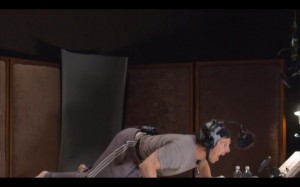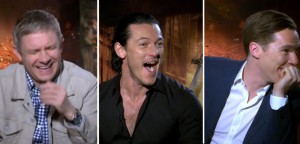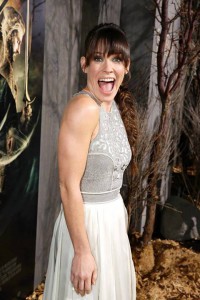 Press: For Peter. Given the fact that you’re working on three films simultaneously, how do you sort of distinguish each film esthetically as you’re making them and then sort of further along those lines, what adjustments or changes do you make, did you make maybe in your approach to assembling this film if at all in response to sort of the reaction from fans to the first film?
Press: For Peter. Given the fact that you’re working on three films simultaneously, how do you sort of distinguish each film esthetically as you’re making them and then sort of further along those lines, what adjustments or changes do you make, did you make maybe in your approach to assembling this film if at all in response to sort of the reaction from fans to the first film?
Peter: I mean there wasn’t really any ability to respond too much because we’d shot everything pretty much…I mean apart from, you know, the ten weeks of pickups we did this year was like half of that was the third movie, so it was five weeks of dramatic stuff. You know, these are…I mean this is a story, this is a script or story that was charted at the beginning and it’s um…and we shot it kind of in chronological order-ish to some degree. And so it was…it is actually interesting because you get, you know, I get…I mean by the time we were done with pickups, I was getting in my groove.
I thought I was, it was, you know, it was interesting. It was interesting to just, to get completely into the narrative in the story because as a filmmaker you’re almost getting swept along with the characters. You think, okay today they’re going (here) and so you actually got the filmmakers on the same journey as the dwarves to some degree over that period of time.
You know the good thing with a middle film is you don’t have to set things up, you literally do just…you can just drop into the story because we’re, you know, assuming that no one’s going to see this film if they haven’t seen the first one.
You just get stuck straight into it. Because, again, I mean as I say, the ultimate life unfortunately, I mean, as much as the romance of the cinema and the big screen and the 3-D and everything else, you know the ultimate life of these movies is going to be one of home video, Blu-rays and downloads and hopefully for years to come so that’s where they are going to find their final resting place. So you kind of, you know, you’re telling a continuous story. Its three movies, but its telling one narrative arc and you’re trying to make each film work individually.
 <Press: So the ending leaves audience aghast because we have to wait another year. So was that always the stop or was it a challenge to figure out where you were going to end this film?
<Press: So the ending leaves audience aghast because we have to wait another year. So was that always the stop or was it a challenge to figure out where you were going to end this film?
Peter: We did talk about it. There was certainly discussion about it. It was just a chance, like it’s very rare that you get to do films back to back whether its two or three films back to back and to actually, to be able to just end on a cliffhanger and think well, you know, we have shot the, I mean I do know what happens in the film and you will see that in a year’s time. You know, I mean I remember when I was, I would have been what – about 17, 18, 19 years old? I remember the Empire Strikes Back had a big cliffhanger ending and it was like three years before the next one came out. I mean we’re being pretty generous. One year. I’ll tell you what – as a Breaking Bad fan? I was hanging out a long time for that last half season or whatever they call it on Breaking Bad this year. So that was a big gap too.
Press: (Hard to hear question about already working with Martin) you’re working with him and because Sherlock is his buddy – your buddy and this one is enemies so it’s talking about it is a different dynamic obviously.
Benedict: Yeah, very, very different. Yeah. Very different. Because one I’m in the room with him and I’m not a psychotic flying napalm machine and you know I can be acerbic and dismissive of him as Dr. Watson. So it’s, yeah, they are friends. They’re in collusion. Yeah, very different. You said it, really. You answered your own question. I don’t really know what to say, sorry.
Press: What is to like about Martin Freeman.
 Benedict: What to like about Martin Freeman? Oh, it’s too early in the day to do this, isn’t it? It’s tricky, it’s tricky. I haven’t got my list for the day ready yet. But um, but he’s very smart, he’s really good company, he’s one of the funniest men I’ve ever met, and he’s a craftsman. He works incredibly hard and creates authentic characters and moments in drama and he’s an inspiration to work opposite and I’ve got nothing but good things to say about Martin.
Benedict: What to like about Martin Freeman? Oh, it’s too early in the day to do this, isn’t it? It’s tricky, it’s tricky. I haven’t got my list for the day ready yet. But um, but he’s very smart, he’s really good company, he’s one of the funniest men I’ve ever met, and he’s a craftsman. He works incredibly hard and creates authentic characters and moments in drama and he’s an inspiration to work opposite and I’ve got nothing but good things to say about Martin.
Peter: The one thing about Martin that I think is amazing as a director is that he gives you choices. What that means is that every single take he does is different. Is it the same as on Sherlock as well?
Benedict: It is.
Peter: He’s just exploring. He’s exploring the whole time. He’s not saying okay I think that one was perfect. I don’t need to go any more than that. He’s actually just, the next take he’s coming up with a different approach to it and sometimes very radically different approach.
Ten years ago I was at a day on the Lord of the Rings we were shooting with Ian Holm who plays Bilbo obviously as an older man and Ian McKellen came up to me and said are you okay with what he does? And I said why? What do you mean? It’s great. And he said, ‘Well, he just, every single take is completely different.’
Ian McKellen is a much more of an actor who has a vision for what the scene needs to be about and he’s moving towards that particular goal and yet Ian Holm was exploring and experimenting and I just said yeah, they’re both great approaches. I mean you’re the stable, steady one, I know where you’re heading and I’m giving you lots of choices and Martin playing the younger Bilbo coincidentally is exactly the same style actor as Ian Holm.
Press: Question for Evangeline. As a huge Tolkien fan have you found that his work has inspired your writing that you’ve been working on and has your experience working on books of your own informed your acting in a significant way, particularly in this role?
 Evangeline: I think Tolkien definitely inspires me as a writer — and inspired me probably towards writing because good story impacts your life. And I think somewhere deep down inside one of the great motivations to write is to have an impact and to say something and then recently I have been doing a lot more studying of writing.
Evangeline: I think Tolkien definitely inspires me as a writer — and inspired me probably towards writing because good story impacts your life. And I think somewhere deep down inside one of the great motivations to write is to have an impact and to say something and then recently I have been doing a lot more studying of writing.
Much like acting, I’m not trained, I’m not formally trained in writing and writing, I think, is a little bit more of a structured specific craft. So I’ve been doing my homework. I have been studying. And as I study and learn about story structure and learn more about what it takes to develop a story that will have an impact, that will resonate with an audience the more it starts to impact my choices as an actress. And I find myself right now as I look at different roles and potential things for the future.
Where before I would read a script and instinctively I knew if I wanted to do the job and if that story was resonating and might feel impactful or say something to the world. Now I’m able to sort of make a cerebral choice. My mind, I can actually break it down and say well what’s missing is x, y and zed and if only they had added these six elements then the script would have come to a place where I would be willing to do it. So I think something that I just… we all know by gut instinct since we’ve been telling stories since the beginning of time we all instinctively know what works and what doesn’t, I’m now starting to intellectually understand that.
The press conference ends and they are clearing the room. TheOneRing.net approaches Benedict Cumberbatch for a final question.
TheOneRing.net: Benedict we never got any kind of time to talk about your other character you voiced. How did you differentiate between your two evil ______.
Benedict: He’s a disembodied spirit, so it had to be something more ethereal, something less grounded and a physicality something a little bit more…well of the voice anyway, but a bit more headstrong intellect rather than a dragon and not fully formed, not fully physical, sort of otherworldly. So I experimented with the idea of — you know normally breath it goes over the vocal cords and the vibration makes a sound.
That goes out into what we know as speech so I thought well, what if you reverse that? So I did stuff where I was, sort of, breath in backwards and tried to do the reverse of that and then other things where we did black speech and then wrote it out phonetically backwards and then let that into the sound and that’s kind of what you hear when you encounter the necromancer speaking in both this and the previous film and yeah and it, again it came out of physical experimentation on the MoCap stage.
In the first one you can see it’s my outline very, very – they say it’s my outline but I can see it’s my outline – walking and the sort of cutout silhouette in the smoke; the kind of ethereal nothingness, the gas that he’s sort of forming from and it was sort of manifested by being on a pulley, being on a bungee, so sort of walking forward at the same time as being pulled back. Peter gave me great notes about the Necromancer. He said he’s like a black hole. All energy falls into him as opposed to Smaug, he’s obviously very aggressive very confrontational.
(After this, Evangeline Lilly approached TheOneRing.net in a big crowd, somehow aware that there was a level of frustration about not being able to get in a question. She walked up to our reporter, confirmed what she suspected and offered to help with an answer if she could.)
TheOneRing.net: Pete loves to shoot. Does anybody think there are really more pickups to come?
Evangeline: [Laughs] Yes! We all said when we left in 2012: Pickups? See ya next year! But now that this film has come out, I’m sort of feeling a little bit more like maybe it won’t happen because I haven’t heard any rumblings but we were all saying that at the end – yeah, see ya next year.


